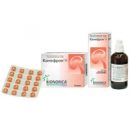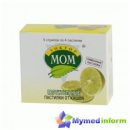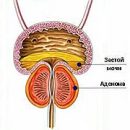Crohn's disease affects all the levels and layers of the gastrointestinal tract, borrowing in the walls of the ileum and gradually spreading further. Very often acute Ileitis (inflamed iliac) with almost no distinction from the symptomatic picture of acute appendicitis. That is why the true disease is found only on the operating table while trying to remove Appendix.
Causes of pathology

The 100% causative agent of the disease has not yet been found, but scientists are converging together in the opinion of the infectious nature of the disease. This thought is pushing positive results from treatment with antibiotics. It is also impossible to forget about periodic failures in the immune system: weakened immunity - an open gate to the body for a wide variety of diseases.
Supplementary «culprit» Development of Crohn's disease:
- Previously transferred virus origin infections (for example, measles).
- Intolerance of certain foods (simply speaking, allergy).
- Chronic stress and nervous overvoltage.
- Dependence on smoking.
- Heredity.
Symptomatic picture of the disease
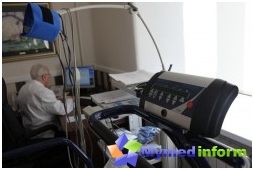
As a result of general blood test An increased concentration of leukocytes is found, increased SE numbers, low hemoglobin, which indicates anemia, reduced levels of lymphocytes and elevated - eosinophils. Biochemical blood test indicates a decrease in the concentration of common protein.
Also use the following diagnostic methods:
- Colonoscopy - you can see and evaluate the condition of the mucous membrane of the intestine. As a rule, ulcerative defects are observed in Crohn's disease.
- Fibrogastroduodenoscopy (FGDS) - explore the stomach and duodenum.
- Radiography with Passage Barium - In case of Crohn's disease, the method detects multiple ulcerative cracks of the intestinal mucosa, as well as a large number of single sections of the intestinal tube.
- Ultrasound - the method allows to inspect the abdominal organs, find out if there is a liquid there, investigate the state of the intestinal loop.
- Computer tomography - method used when there are suspicions for complications (abscess or accumulation of infiltrate in the abdominal cavity).
Treatment of the disease
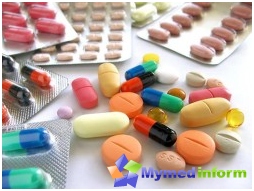
The main rate in the treatment of pathology is made on medicines, namely - on antibiotics. Surgical operation threatens to patient only in a very neglected case of the disease.
From a wide range of antibacterial drugs, preference is given to ciprofloxacin and metronidazole (take up to 1000 mg per day). Preparations can be taken comprehensively or alternately. The course of treatment is long - about 6 weeks.
As an anticorcidal agent use Mesalazin (3-4 g per day), the patient is forced to take it for six months. If the control examination confirms the positive shifts in treatment, the drug is canceled.
Also, the patient certainly sits on a diet with a high content of protein substances and vitamins, trying to limit itself from food with a large percentage of fatty and vegetable products, as part of a coarse fiber. Smoking and alcoholic beverages impose strict taboo. To feel good, a person must eat products that do not cause irritation of the already vulnerable intestine: soup on diluted meat broth, thoroughly rubbed dietary meat (rabbit, chicken), oatmeal and buckwheat, cooked on the water, welded eggs or omelet, fresh low-fat cottage cheese, berry jelly, soft pears, kissel. From most dairy products (sour cream, milk, ryazhenka) have to refuse - they cause diarrhea. Under the strict ban also spices, spices and vegetables. You can drink not strong tea, cocoa (only not with milk!), ragners of rose hips or cherry fruits.
Treatment of Crohn's disease by folk remedies
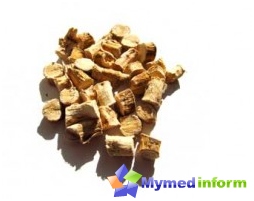
- Wash the fresh root of Altea, place it in a container with a small amount of water and leave there until the liquid acquires the mucus consistency. The mucus contains all useful and, most importantly, anti-inflammatory substances rich in Altei. Take 2 dessert spoons of therapeutic agent in the morning and in the evening, after diluting mucus 1 cup of cool boiled water.
- Unpassed young sunflower heads need to break into small pieces. Store raw materials in glass containers. A glass of crushed sunflower need to fill 2.5 cups of ethyl (medical alcohol), after which it is tightly close the glass and insist for 9 days. One dessert spoonful of the finished therapeutic tincture is diluted with 100 ml of cool warm boiled water and take twice a day 15 minutes before meals. Sunflower tincture drink 3-4 weeks, then rest 1 month and repeat the course of treatment again. The tool successfully removes inflammation and strengthens the mucous membrane of the intestinal walls.
- One cup of onion husk need to pour 8 glasses of water and brought to a boil on a strong fire, then the flames are reduced to boil the decoction on a slow heat about 1 hour. At the same time, the container in which the raw materials are covered only by half. Give the brave to cool - during this time, the tool will also have time to stand. Bow medicine with anti-inflammatory and antioxidant properties Take 100 ml from 3 to 6 times a day.
Prevention of the disease
A clear plan for the prevention of Crohn's disease has not yet been developed, because it is still reliably unknown, what causes the development of the disease. Therefore, everything that can be done is not to get sick - keep a healthy lifestyle and to treat all the pathology of the gastrointestinal tract on time.
When any of the listed symptoms of Crohn's disease appears, you need to immediately consult a doctor to clarify the situation, since the early diagnosis of the disease guarantees the lack of development of complications.






